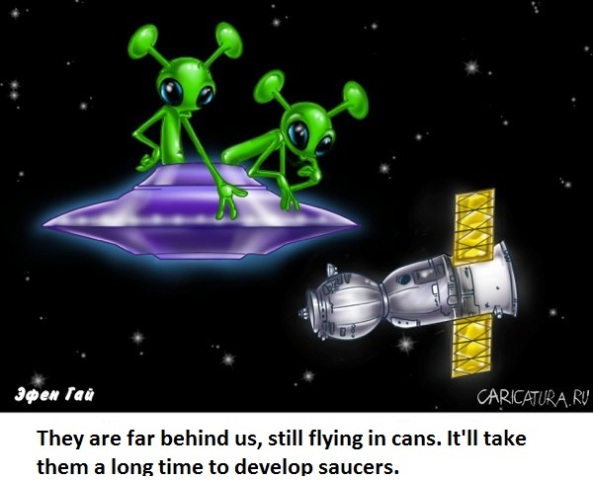
Two weeks or so ago, NASA scientists announced the discovery of Kepler-186f. Kepler-186f is special because it marks the first planet almost exactly the same size as Earth orbiting in the “habitable zone” – the distance from a star in which we might expect liquid water, and perhaps life. And — what do you know? — only a mere 492 light years away in the Cygnus constellation.

It might look pretty, something like this. The coloration of the plant life is somewhat “autumny” yellowish. Scientists imagine it’s due to the manner in which the planet reflects light. Water and clouds , they say, might be rather orange.
Each new discovery of an Earth-like planet in the habitable zone, such as Kepler-186f, makes it more and more plausible that there are — there simply must be! — planets other than Earth that might support life.
Well then, should we, perhaps, expect visitors from Kepler-186f?
 There is, of course, this pessimistic “Rare Earth” hypothesis… The evolution of complex life requires an exceedingly large number of perfect conditions:
There is, of course, this pessimistic “Rare Earth” hypothesis… The evolution of complex life requires an exceedingly large number of perfect conditions:
- The planet must be in the habitable zone of the sun;
- The star must be far enough away from the galactic center to avoid destructive radiation;
- The gas giants must be massive enough to sweep asteroids away from the planet’s trajectory
- The planet has to have an unusually large natural satellite (like the Earth’s moon) to stabilize the axial tilt. (Such tilt gives us different seasons.)
These are just a few prerequisites. The emergence of symbolic language, tools and intelligence could require other such “perfect conditions” as well.

Most of the articles about the discovery of Kepler-186f I came across have one thing in common. Immediately following the NASA’s announcement they say something ominous, like this: What did not make the news, however, is that this discovery also slightly increases how much credence we give to the possibility of near-term human extinction. This because of a concept known as… the Great Filter!
Oy!
The Great Filter is an argument that attempts to resolve the Fermi Paradox: why have we not found aliens, despite the existence of hundreds of billions of solar systems in our galactic neighborhood in which life might evolve?
As the namesake physicist Enrico Fermi noted, it seems rather extraordinary that not a single extraterrestrial signal or engineering project has been detected. (from some article written by someone smart to enlighten the rest of them people)
Well, obviously, Fermi choose to disregard the entire “scientific field” of UFO conspiracy theories.
Seriously now. The Great Filter was discussed in articles with scarily sensational titles such as: Could our search for alien life trigger the end of humanity? ‘Great Filter’ theory suggests habitable exoplanets may spell our demise and Why habitable exoplanets are bad news for humanity’s future.
This prompted me to turn to Wikipedia (for solace mostly) and read an entire article on Search for extraterrestrial intelligence. Great read for those who knows little, but wants to know something. Particularly reading that each discovered “habitable exoplanet” spells doom for humanity’s future...
Searching and finding some cartoons about aliens helped as well.
We still have many reasons to think intelligent life might not emerge. The atmosphere might be too thin to prevent freezing, or the planet might be tidally locked, causing a relatively static environment. Discovery of these hostile conditions should be cause for celebration. As philosopher Nick Bostrom once said:
The silence of the night sky is golden … in the search for extraterrestrial life, no news is good news. It promises a potentially great future for humanity. (from one or the other article mentioned above.)
The “golden silence” might also be the explained by intelligent life’s failure to survive for long. Why? Perhaps it self-destructed by developing some suicidal technology or made a wrong turn toward unsustainability… 
For 200,000 years humanity has survived super-volcanoes, asteroid impacts, and naturally occurring pandemics. But our track record of survival is limited to just a few decades in the presence of nuclear weaponry. And we have no track record at all of surviving many of the radically novel technologies that are likely to arrive this century.
Esteemed scientists such as Astronomer Royal Martin Rees at the Cambridge Center for the Study of Existential Risk point to advances in biotechnology as being potentially catastrophic. Others such as Stephen Hawking, Max Tegmark and Stuart Russell, also with the Cambridge Center, have expressed serious concern about the exotic but understudied possibility of machine super-intelligence.
Still, the Great Filter or not, it shouldn’t reflect badly on Kepler-186f, should it?
Makes me wonder, though, what does f in 186f stand for…


